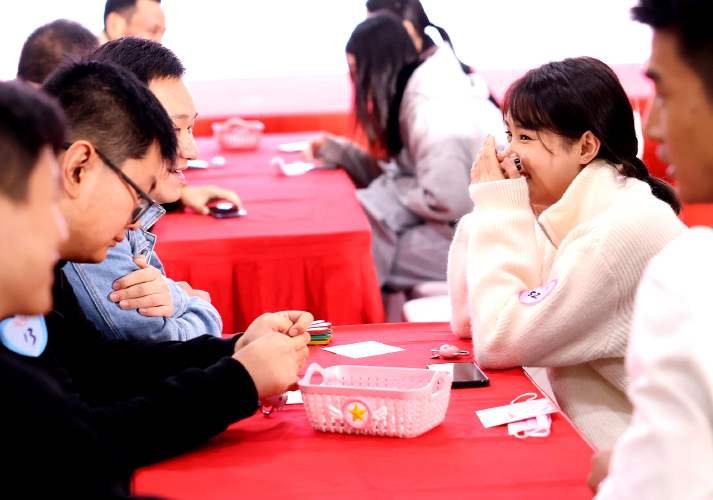| China |
| A match made in heaven? | |
|
|
 A group wedding in Taizhou, Zhejiang Province, on May 20 (XINHUA)
'Gentleman No.1, a 28-year-old professional from a company in Jingyuan, Ningxia Hui Autonomous Region; Gentleman No.2, a 34-year-old entrepreneur from Tianshui, Gansu Province…" These are the kinds of introductions you'll hear from Ma Juan, the host of a Douyin livestream room dedicated to matchmaking.
These livestream rooms in the Chinese version of TikTok and other social media platforms are virtual spaces where content creators can broadcast live to their followers. Content can range from musical performances and makeup tutorials, to personal vlogs and, as mentioned here, trying to help people find their forever love. The rooms often feature real-time interactions, where viewers can comment, send virtual gifts and engage directly with the streamer. Ma's setup features eight guests and one matchmaker, the lively host, arranged in a nine-grid on the screen. Here's how it works: Within three minutes, if any guest becomes interested in someone introduced by the host, they can apply to join a special group chat. This chat, set up by the host, allows guests to obtain the contact information of their "love interest" and start one-on-one conversations. If no one shows interest, the next batch of guests is invited to join the livestream room for interactive matchmaking. According to the National Bureau of Statistics, the number of singles in China stood at 240 million as of late 2022, accounting for some 17 percent of the country's total population. New methods of "blind dating," such as participating in matchmaking livestreams, are gaining popularity among single young Chinese who are working on expanding their social circles and quickly finding their Mr. or Mrs. Right. Going live for love In Ma's livestream room, guests usually introduce their basic information, partner preferences and future plans for marriage and family life within a brief 10 to 15 minutes. Participants are not allowed to use beauty filters while on camera. Any netizen can click to enter and watch the stream. In her matchmaking livestream room, the male and female guests who join the interactive livestream are primarily aged 25 to 28. Male guests always outnumber female guests. According to Ma's observations, appearance, communication skills and financial status are the three major factors participants focus on. Appearance, communication skills and income are determining factors for a successful date, she explained to China Youth Daily newspaper. In addition to more serious matchmaking livestream rooms like Ma's, there are also those where the atmosphere is a little lighter. In these chat rooms, young singles socialize and release stress by talking with each other. They voluntarily show their talents, like singing a song or doing voice-overs for animated characters. They also discuss the currently very popular Myers-Briggs Type Indicator, a system that categorizes people based on their traits, tendencies and other characteristics, and how it reflects on their life choices. The livestream room can attract up to 100,000 real-time viewers. And participants and viewers living in the same cities regularly host in-person gatherings. However, these matchmaking livestreams are sometimes abused by cheats and even swindlers. Some related livestream rooms require participants to provide ID photos, while others lack any verification mechanism, allowing scam artists to slip into the fold. Thirty-four-year-old Zhou Xuan, a teacher in Deyang, Sichuan Province, has been an active participant in matchmaking livestreams over the past two years. Last August, she was interested in a male guest who claimed to work in the public sector. They chatted online for about a month, but the man never initiated a real-life meetup, which made Zhou suspicious. Eventually, the man asked Zhou for 20,000 yuan ($2,761), which made her realize she had fallen into the online arms of a scam artist. She refused his request. Two months later, Zhou paid 100 yuan ($13.8) to participate in a face-to-face blind date arranged by a matchmaking influencer. The date lasted under 20 minutes, during which the 36-year-old man claimed that he had never been married because he was too busy with work. Zhou later discovered that he had actually gotten divorced five years earlier and had an 8-year-old child. "Matchmaking livestreams can attract all kinds of people," she lamented. Li Junhui, a researcher specializing in personal information protection at the Center for Intellectual Property Rights Studies at the China University of Political Science and Law, said matchmaking livestreaming platforms need to balance user verification, information protection and risk management to provide a safer and more trustworthy service.  A matchmaking activity in Shanghai in October 2021 (XINHUA)
Matchmaking star While many matchmakers draw a large online audience to their livestream rooms, one matchmaker in Kaifeng, capital of Henan Province, is popular both on- and offline. She draws physical crowds from all over the country to a beautiful scenic spot in her city, where her matchmaking show titled Wang Po Matchmaking takes place. "Wang Po" is actually a matchmaker from Water Margin, one of China's four great classical novels, set during the late Northern Song Dynasty (960-1127). In this modern twist, the performer, dressed in traditional Chinese attire, takes on the role of Wang Po, pairing up tourists who step onto the stage. Visitors flock to Kaifeng not just in pursuit of finding their "happily ever after," but also to enjoy the lively atmosphere and take in the local culture and history. Her service is free of charge. "Most people signing up for the matchmaking service believe in love at first sight and meeting someone by accident," Zhao Mei, who plays Wang Po, told the media. Every year, some 50 pairs matched by her eventually tie the knot. The show has also received unexpected online attention. Videos on Zhao's account on Douyin have garnered some 10 billion views. As of mid-May, the account had over 6.7 million followers. Similar shows have been staged at scenic spots in different cities, each starring their own "Wang Po," meeting young singles' increasing demand for a touch of romance. Marriage registrations in China have been on the decline for years now, dropping from some 13.5 million couples in 2013 to 9.47 million in 2019, and to just 6.8 million in 2022. However, 2023 saw a rebound to about 7.7 million registrations, according to the Ministry of Civil Affairs. The high pressure of fast-paced daily life puts many young people off the thought of embarking on a serious relationship—let alone marriage. Plus, weddings generally remain very expensive affairs. According to the China Population Census Yearbook 2020, the average age of first marriages rose to 29.38 for men and 27.95 for women, from 25.75 and 24 in 2010. The Chinese Government has issued pro-marriage policies to encourage young people to tie the knot earlier by making marriage registration easier for couples from different provincial regions and encouraging simpler wedding ceremonies. Local governments have also introduced policies to support matchmaking activities. Time will tell if the encouragement will see more young Chinese say "I do" to marriage. Copyedited by Elsbeth van Paridon Comments to luyan@cicgamericas.com |
|
||||||||||||||||||||||||||||
|